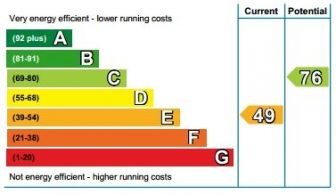 Just over a fifth – 21% – of tenants have spoken to their landlords about making energy efficiency improvements to their property, according to Shawbrook’s latest research.
Just over a fifth – 21% – of tenants have spoken to their landlords about making energy efficiency improvements to their property, according to Shawbrook’s latest research.
In response to this, a quarter of landlords (26%) have already made energy efficiency improvements to reduce energy bills for tenants, and to meet proposed EPC requirements.
The study also found that landlords have spent an average of £8,900 so far on improvements – which is almost 50% more than they had expected they would need to spend. However, over a fifth (22%) of landlords say they have no idea how much updating their properties will cost.
When it comes to the energy-efficiency changes tenants would like to see made to a property, solar panels are the most popular choice with 26% of respondents stating that they would like them to be installed. A further 22% would like a new boiler, and 20% stated that double glazing would be their preference. Nearly a fifth of tenants – 17% – said they would even consider living in a smaller property if it meant it was more energy efficient.
Shawbrook’s latest figures come as the government has pledged to reduce energy consumption from buildings and industry 15% by 2030, with aspirations for properties to have a minimum EPC rating of C in England and Wales by April 2025.
Under current government regulation, landlords are not expected to spend more than £3,500 on upgrades to meet the current EPC requirements for a rating of E. However, proposed changes could see all rental properties requiring an EPC rating of C by 2028, and a potential increase to this cap to £10,000, meaning landlords could be required to spend more to meet minimum requirements.
The research, which is part of Shawbrook’s ‘Confronting the EPC Challenge’ report, highlights the role that both lenders and brokers can play in supporting landlords with creating a more sustainable property portfolio.
As future legislation could see landlords unable to take on new tenants or face fines if they fail to comply with the changes, it prompts a need for further education across the sector to ensure landlords understand their role in meeting compliance across their portfolios, and the associated costs.
Emma Cox, MD of real estate at Shawbrook, said: “It’s likely that efficiency standards will become tougher in the future, which is just one of the reasons that landlords should take note of tenant’s requests and start making a plan.
“At Shawbrook we are aware of the difficult housing climate and want to support our landlords as they look to improve the energy efficiency of their properties. We’re continuing to work alongside UKGBC to regularly communicate with our broker partners, and ensure they clearly understand the impact of the regulation on landlords, and their tenants.
“As trends now point towards tenants favouring more energy efficient properties, these changes should not just be seen as a tick-box requirement by landlords, but also a worthwhile investment. If tenants feel their accommodation is more cost efficient and sustainable, they will be more likely to stay, which in turn will benefit landlords.”


You wonder how all this going to pan out. What landlords have £9,000 per property kicking about to lay out on EPC upgrades especially when it does not benefit the landlord at all and only saves the tenants a few hundred pounds a year? Owner occupiers are not all rushing out to spend £9,000 as they can see it will take years to recover the outlay and also they don’t have £9,000 lying about either.
I can see the day that after 2025 as rental houses especially the cheaper lower rent ones housing poorer tenants which tend to be older and need more spending on become vacant the landlord will just sell up rather than stump up nearly two years rent to upgrade the EPC. No income or sell up, it’s a no brainer.
Come 2028 when all rented places will have to have a C rating to continue to be rented I expect there will be lots of places that still will not make the grade. What happens then? A mass sell up maybe, but don’t forget that selling up is not going to be a mandatory ground so you will need a judge’s permission to sell up. Selling up to avoid upgrading an EPC might not be an acceptable reason. Maybe people are hoping the Government will see sense but they never have before on so many issues.
You must be logged in to like or dislike this comments.
Click to login
Don't have an account? Click here to register
As things stand, tenants have little choice. Somewhere to live, at a rent they can afford, or not.
I’m not saying it’s acceptable, it’s just a fact, which is unlikely to improve any time soon.
I believe landlords can claim an exemption from EPC C if the costs are considered too excessive for the value of the property. If so, the most inefficient rentals will remain inefficient.
You must be logged in to like or dislike this comments.
Click to login
Don't have an account? Click here to register